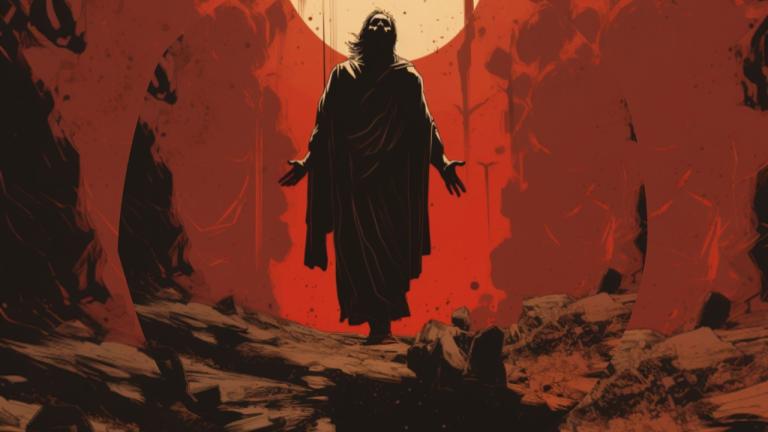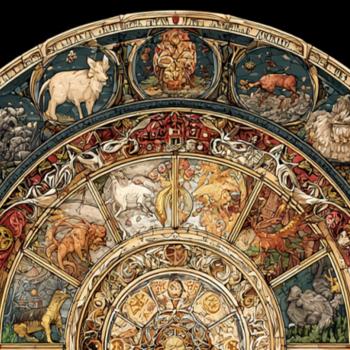
SAYING 82
Jesus said: “He who is near to me is near the fire, and he who is far from me is far from the kingdom.”
This saying is especially fascinating because it appears to be one that other early Church Fathers quoted from or alluded to in their own writings. For example, Origen says:
“But the Saviour himself saith: He who is near me is near the fire; he who is far from me, is far from the kingdom.” [Origen, Homily on Jeremiah, XX, 3]
Ignatius of Antioch alluded to this saying in his letter to the Smyrnaeans when he said:
‘Why have I given myself up to death, to fire, to sword, to wild beasts? But near sword is near god, with wild beasts is with God.’
Justin Martyr said, in his Dialogue with Trypho:
“When Jesus went down into the water, a fire was kindled in the Jordan.”
Some scholars point out the similarities between this saying from Thomas and a proverb from Aesop which says:
“Whoever is near to Zeus is near the thunderbolt.”
So, what are we to make of this saying in light of everything else we’ve seen in Thomas’s Gospel up to this point? Is the fire meant to be a metaphor for destruction, as we see in other sayings? Or is it meant to serve as a symbol of fear, or danger? Is Jesus suggesting that being near to him is to be near one’s own mortality? Or is the fire meant to refer to the consuming nature of God that burns up all that is false to reveal what is pure and true, as in the refiner’s fire reference used so often in Scripture?
A lot depends on how we define the term “fire” in the context of this saying. If we assume fire stands for power or destruction, we’ll read this as a warning. If we think the fire is a metaphor for truth, we’ll be drawn to seek warmth around this blazing flame. My guess is that the fire Jesus refers to here is more along the lines of the purifying fire that exposes the lies, pushes back the darkness, and clarifies the truth of our Oneness with God and our inseparable connection with one another.
There is a contrast here between near and far that we should pay attention to. To be near to Jesus is to be near the flame. That must mean the flame is good. To be far from Jesus is to be far from the Kingdom, which isn’t a good thing. In fact, we should already know that the Kingdom of God is within us all. So, the only sense in which anyone could really be “far from the Kingdom” is only a perception or the lack thereof.
Since no one could ever truly be “far from the Kingdom” which dwells within everyone, then what Jesus is saying is that drawing nearer to him is to become more aware of the reality of that Kingdom within. The Kingdom of God is as near to us as Jesus is. Which is to say, one and the same. There is no separation between Jesus and the Kingdom, and there is no separation between us and Jesus, or God, and so we are in the Kingdom and the Kingdom is within us. The closer to draw to Jesus and his teachings, the more we become aware of that ever-present reality of Christ within everything, everywhere and at all times.
Drawing closer to Jesus is drawing nearer to the fire that illuminates the Truth of God’s Kingdom within us. Once we realize this overwhelming truth, we can never be far from Christ or God’s Kingdom again.
**
INNER/CIRCLE – A self-paced online course on the Gospel of Thomas led by Keith Giles
Curious about the Gospel of Thomas? This course will examine select sayings of Jesus from this text, and explain why it’s not a true “Gospel”, not truly “Gnostic” and yet, quite possibly, an authentic collection of the secret teachings from Jesus recorded by his disciples. Plus, an exploration of why the text was buried in 367 AD and uncovered in 1945.
REGISTER HERE>
Keith Giles is the best-selling author of the Jesus Un series. He has appeared on CNN, USA Today, BuzzFeed, and John Fugelsang’s “Tell Me Everything.” He hosts the Second Cup with Keith podcast, and co-hosts the Apostates Anonymous podcast, and the Heretic Happy Hour Podcast.
His latest book, SOLA DEUS: What If God Is All Of Us? is available now on Amazon in Paperback and Kindle HERE>
Find out more about online courses HERE>














